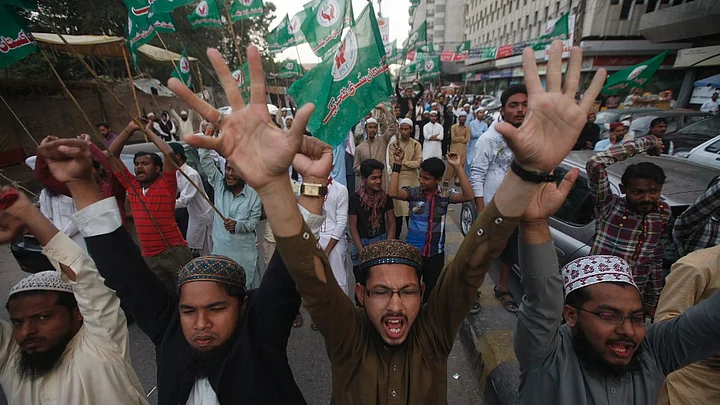A recent escalation of violence in Pakistan, inspired by reports of blasphemy online, has highlighted the need for the country’s restrictive laws to be changed. In early May, a 10-year-old boy was killed in the town of Hub after he was caught up in a brawl related to a young Hindu man who had been accused of putting up blasphemous content online.
A month earlier, a 23-year-old university student was lynched to death in Mardan in the north of the county for publishing blasphemous content online. And in January, five Pakistani bloggers, who were critics of censorship, disappeared, though all of them were released three weeks later.
British lawmakers introduced legislation aimed to protect minorities from religious persecution in the middle of the 19th century, back when Pakistan was part of the complicated political landscape of South Asia, comprised of British India and hundreds of independent princely states.
It was these laws that would later be turned into strict blasphemy rules specifically relating to Islam.
Religion was the genesis for the creation of the Pakistani state. As the end of British rule loomed, Muslims feared Hindu domination would follow British withdrawal. The head of the Muslim League, Muhammad Ali Jinnah, who had lobbied for a separate state, became the first head of Pakistan following partition in 1947.
It was a bloody birth and constituted one of the largest recorded migrations ever of people across borders as Hindus and Sikhs left the newly created Pakistan for India, and Muslims in India crossed the border to both East Pakistan and West Pakistan (later Pakistan and Bangladesh).
As a “home for the Muslims of South Asia”, religion features significantly in the collective consciousness of Pakistan, and has, at times, featured prominently in politics. In his first address to the Pakistani nation, Jinnah was clear about his secularist stance: “You may belong to any religion, caste or creed. That has nothing to do with the business of the state.” Some subsequent leaders have disagreed.
In 1974, the head of state at the time, Zulfikar Ali Bhutto, pronounced Pakistan’s Ahmadi community as non-Muslim, a nod to the power of conservative religious lobby.
Laws Hardening
Under the military government of general Zia-ul Haq in the early to mid-1980’s, the country went through what is known as Pakistan’s period of “Islamification”. It was during this period that amendments were made to the framework of legislation against religious persecution, which the country had inherited from the British colonial rule.
The current blasphemy laws hark back to that period when three key amendments were made. The first, in 1980, outlawed derogatory remarks against people who followed Islam. Then in 1982, wilful desecration of the Qu'ran was criminalised. And, in 1986, blasphemy against the Prophet Muhammad was made into a criminal offence punishable by death.
Verbal or written, direct or indirect besmirching of the Prophet Muhammad still carries a death sentence today. Many have argued that these laws discriminate against religious minorities, since a disproportionate number of those convicted of blasphemy come from religious minorities. They have also been used as an easy way to settle personal quarrels, since only the word of the accuser is necessary to bring about a prosecution.
Some Pakistani politicians have tried to amend the legislation. In 2010, Sherry Rehman from the Pakistan’s People Party proposed a private members bill to amend Pakistan’s Penal Code and the Code of Criminal Procedure, the two primary sources of criminal law. She argued that:
The aim is to amend the codes to ensure the protection of Pakistan’s minorities and vulnerable citizens, who routinely face judgements and verdicts in the lower courts where mob pressure is often mobilised to obtain a conviction.
The bill was batted down by the religious lobby.
It is a dangerous business to speak out against the blasphemy laws. In 2011, Salman Taseer, the then governor of Punjab was murdered by his own bodyguard for his public criticisms of the blasphemy laws. Soon after, another critic of blasphemy legislation, Shahbaz Bhatti, the minister for religious minorities, and a Christian was shot dead.
Update for Social Media Age
In the recent attacks, the proliferation of social media use in Pakistan has opened up a space for public debate on religion and politics in the country. But the disappearance of social media commentators and public lynchings of those who put up online content deemed to be blasphemous shows that there are some in the country who want to shut down debate. They are wreaking age-old religious tyranny on modern forms of online expression.
Jinnah’s vision was for religion to be a private matter. But in contemporary Pakistan, legislation inspired by religion is still used as a tool for the political persecution of religious minorities and to settle personal quarrels in public.
Many countries have some iteration of blasphemy legislation to deal with genuine cases. But Pakistan needs to rethink its laws so that they are updated for the social media age – and cannot be used to unfairly target religious minorities or resolve personal vendettas.
(This article was originally published in The Conversation.)
(At The Quint, we question everything. Play an active role in shaping our journalism by becoming a member today.)
